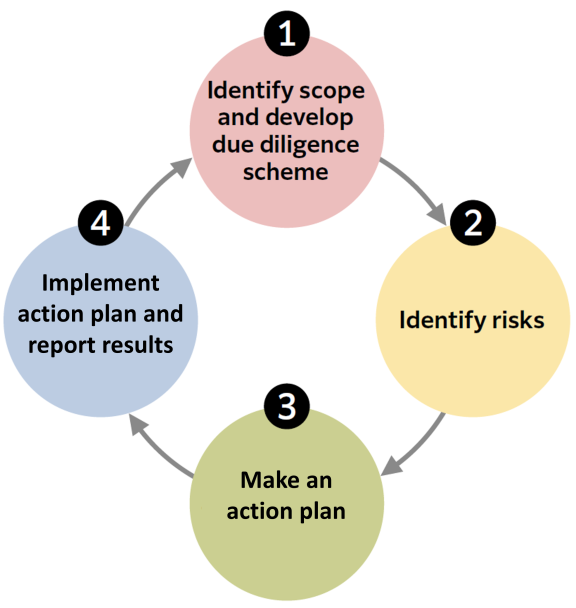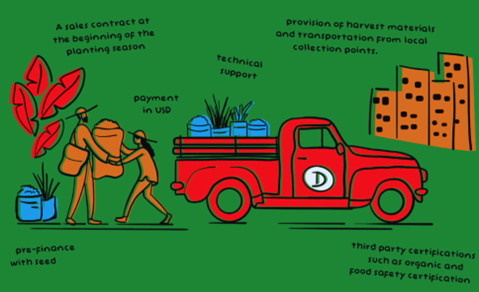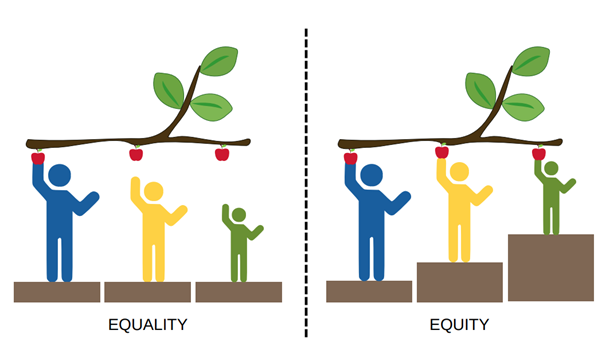
8 tips on how to become more socially responsible in the natural ingredients for health products sector
It is now more important for global companies and European consumers to comply with social standards. This means that exporters must have very good social responsibility. This study offers tips to include social responsibility in your business. There are examples in this study for your sector, to help you to use the tips. Focusing on social responsibility improves your company's reputation. It will attract new customers and increase your opportunities to enter the European market.
Contents of this page
- Learn about due diligence requirements and EU laws on social responsibility
- Get to know your product and the producers you work with
- Ensure your producers are fairly compensated
- Check options to diversify your producers’ source of income
- Make sure your employees are healthy and safe
- Treat everyone fairly and equally and ensure there is no child labour
- Adopt a sustainable certification standard
- Develop your own Corporate Social Responsibility policy and define what makes your company unique
1. Learn about due diligence requirements and EU laws on social responsibility
Because you export natural ingredients for health products to the European Union (EU), you need to know about the changes in legislation in the EU that involve social responsibility in agricultural supply chains. One of the key changes that the EU implemented in 2021 was the EU Due Diligence Directive. This directive says that companies must “identify and, where necessary, prevent, end or mitigate adverse impacts of their activities on human rights, such as child labour and exploitation of workers, and on the environment, for example pollution and biodiversity loss”. These requirements will come into force for the largest companies in January, and in 2026 they will apply to medium and large companies. Although these standards do not apply directly to small and medium-sized enterprises (SMEs), European companies that operate in agricultural supply chains will have their own strategy for Corporate Social Responsibility (CSR).
Basically, European companies will start to do due diligence in the whole supply chain, and they will try to show that they really want to do business responsibly.
Exporters of natural ingredients for health products will have to do more to comply with stricter quality standards and other requirements for social responsibility. This UNICEF Supplier Sustainability Questionnaire looks at different aspects of social accountability, including community development and fair pay, and it can give you a better idea of the kinds of questions you may need to answer. Third-party audits are another method that will be used to check activities.
More and more European companies are shortening their supply chains and visiting their producers personally. This means that you must build your relationship with your producer and make changes that show your value within the supply chain. European buyers will choose their sourcing partners more carefully, based on your commitment to social responsibility and what you are doing to improve this.
To improve your chances of exporting to Europe, we advise you to comply with the minimum social standards and include these standards in your business. Figure 1 gives an example of how to do due diligence for human rights in your business. If you want more detailed information, you can also do a ‘self-assessment’ to check how your company complies with international social standards that are set by the International Labour Organization (ILO).
Figure 1: TAKASAGO (Japan) example of due diligence for human rights

Source: adapted from TAKASAGO, 2023
Tips:
- Read this guide from Business for Good that talks about Corporate Social Responsibility and how to get it right.
- Use the ISO 26000 as a tool for self-assessment of your social responsibility. It is not a certification, but it can demonstrate your commitment to ethical and sustainable business practices.
2. Get to know your product and the producers you work with
There are social issues that are bigger than just your actions. To show that you care about being socially responsible, it is important to have a strong relationship with the people who supply your natural ingredients. First, you need to talk to everyone who is involved in making the materials that you use. This will help you to have a good effect on the community and show your European clients that you are doing good things.
You should also visit the producers to see how they live and work. This will help you to understand their methods, materials and equipment. Look at Figure 2 to find out more about the different kinds of social responsibility in your business.
After the visit, ask the producers to answer a questionnaire about their social performance. This will help you to understand how their work affects people and the environment.
Figure 2: Visual guide to make areas of your business socially responsible

Source: Ann Armbrecht, Sustainability and Regenerative Practices, Toolkit 2.0, 2023
If you have a good relationship with your producer, this can improve productivity and quality. You can help producers to change things that are bad for their overall production practices. For instance, Traditional Medicines built a low-cost well in the areas where their female harvesters work. This initiative meant that women no longer needed to travel more than 10km to get water. These women improved the amount and the quality of the senna that they supply to Traditional Medicines, because they spent less time travelling to get water.
Tips:
- Try to identify a ‘lead’ farmer in your sourcing community who is passionate about his or her job. Work with this person to make changes, because these people are more likely to inspire other people.
- Talk to all the stakeholders in your supply chain to understand existing challenges and look at problems together as equal partners. You are not the only person who can solve problems.
- Talk to your client in the European market about your options to work together on larger issues for social responsibility.
- Download the Sustainable Herbs Program Toolkit for detailed information on everything about sustainability in the sector for natural ingredients for health products.
3. Ensure your producers are fairly compensated
Recently, the discussion about fair payment in Europe has changed so that people talk more about living wages and incomes. A living wage or income is the minimum income that supports a reasonable standard of living. The minimum wage in your country may not be enough to support this standard. As a socially responsible employer, it is important to make sure that you pay your workers a living wage.
You also need to keep records of prices and transactions, because your European client may ask you about this. We advise you to sign contracts with the producers or producer organisations. Table 1 offers some ideas on how to formalise agreements with your producers.
Table 1: How to improve payment conditions in the upstream supply chain
| TYPICAL PROBLEMS IN PAYMENT | OPTIONS TO IMPROVE |
| Because of an imbalance in power dynamics, traders do not pay producers the price that they agreed to pay. | Organise meetings with producers and traders to clarify the role of each stakeholder within the supply chain. Agree to share benefits fairly and sign contracts with the producers’ representatives and the traders. |
| Women are paid less than men. | Make sure that men and women are paid the same amount for the same work. Include this in the contract. |
| Producer cannot read and write, so they cannot sign the contract. | Sign contracts with other family members as representatives. |
| There are too many producers, so it takes too long to sign contracts with them all. | Sign a contract with a representative of a group. Make sure that the producer is involved in negotiating the price and payment conditions. |
| Producers employ day workers, who cannot be considered in formal price setting. | Agree on minimum wages that must be paid to everyone who works on your project, and make sure that this is part of the contract with the producers. |
| Especially for niche products: demand for the product fluctuates a lot, and prices change from year to year. This means that producers do not know what they will be paid. | Talk to your European client to find out if you can sign multi-year contracts or purchasing orders that include a minimum price and amount that will be bought. |
| Producers sign a contract with your company/trader but sell their product to a different trader. | Make a production calendar with producers, and identify the inputs you need for each production step. Check if they need pre-financing and make sure that money is available at harvest time. If the production area is not close to any towns or cities, it may be useful to create a fund to collect the harvest and pay the producers on time. |
| The quality of the product varies a lot. | Agree on a quality standard with your client and with the producers. Use a quality-based pricing system. Check to see if the cleaning process can be done by the community. This can increase your productivity by reducing waste, and it can also add value at the local level. |
Source: ProFound and Christine Woda, 2023
All these things can make your producer more committed to your business. This can improve the quality of natural ingredients for export, and it can help your producers to deal with climate change.
There are many different ways to introduce fair pricing systems with your producer. Doselva is a producer and exporter of organic spices from Nicaragua. They sign pre-harvest contracts with the producers at the start of the planting season. They also pre-finance producers with the right seed and then collect their returns at harvest time. This gives producers security, because they know that they have support, even before they harvest the natural ingredients. Figure 3 shows a clear process for producer support that you can use in your company.
Figure 3: Example of how you can support your producers in a fair pricing system with inputs

Source: Doselva, 2023
Tips:
- Check the WageIndicator website for information about living wages in your country. Keep records about your employees’ pay and work hours.
- Make sure that women and men are paid the same amount for the same work.
- Check if at least minimum wages are paid for all activities. People should be paid more for dangerous or challenging work, for example climbing trees or working with hazardous chemicals.
- Check with your client to see how producers could be compensated for poor harvests that are caused by climate change or disasters.
4. Check options to diversify your producers’ source of income
You can also show your commitment to social responsibility by supporting your producers in their economic empowerment. You can develop training programmes to help with production problems, improve good agricultural practices or increase productivity. You could also explore ways to support your producers to diversify their sources of income through crop diversification and crop rotation. This is good for them and also good for you. They could build and diversify the ingredients they supply, and you could get a wider range of natural ingredients from them for export.
You can also offer to support your producer to formalise their organisation. This makes it possible for producers to get support from non-governmental organisations or public organisations to improve their business skills or production techniques.
You could also encourage your supplier to diversify their markets so that they are less dependent on you. Of course, you should only do this after you have signed contracts for what you want to buy. This may sound like a risk, but it can be good for you to build your relationship with your producer and encourage them to diversify their income streams and add different buyers. If your producer is economically stronger, they are more likely to produce good raw materials for your export business.
Tips:
- You can share these free videos with farmers in your network to help them understand regenerative agriculture and how multi-cropping can help them financially.
- Talk to European clients who may be willing to help train your farmers or to pay for their training through organisations like the Rodale Institute.
- Read the Tips to go green to learn more about regenerative agriculture and multi-cropping.
- Check to see if the producers can do part of the processing; this can increase productivity and add value at the local level.
5. Make sure your employees are healthy and safe
Make sure that your employees work in safe and reasonable conditions. This involves preventing incidents in the workplace and making sure that people have the right sanitation, equipment and first aid kits. When producers are safe and respected, this also creates a good working environment that makes your producers more productive and motivated.
It can be especially hard to ensure safe working conditions in the sourcing of natural ingredients, because they are often wild-harvested in remote areas that are hard to reach. The best way to clarify the possible health and safety risks is to meet with the producers and work together to identify areas that may need to improve.
Paviramenthe Fair Organic is an Indian producer and exporter of various natural ingredients for health products. They provide special protective equipment and gloves, goggles and aprons for workers who do dangerous jobs. First aid kits and fire extinguishers are also available. Workers are also trained so that everyone knows how to stay safe, and the producer gives sanitary napkins to women and girls.
Here are some suggestions to improve health and safety conditions:
Create a safe and clean workplace
Make sure you have preventative measures in place to avoid injuries and illness. You can give your employees the protective equipment they may need, for example helmets, gloves, goggles and masks. You can also arrange regular medical checks for your employees.
Have first aid kits available and arrange transportation for emergencies
Make sure that you have first aid kits available, and check that the set is complete and that nothing has expired. If possible, have a vehicle available for emergencies to drive your employees to medical facilities. You can also set up medical centres in communities close to where you operate, to give your employees emergency medical attention if they are far away from a hospital. To prevent the same accident from happening again, record all health-related incidents and try to correct them.
Provide a decent recreation area
Check the resting facilities – they should protect workers from the rain, sun, cold and heat, and they should include basic sanitary facilities for hygiene, for example toilets and washing facilities. Check to see if workers have clean drinking water.
Ensure access to improved working tools and share knowledge on best practices
Natural ingredients are produced under quite basic conditions. This may involve climbing trees or going into deep vegetation where there are dangerous animals. You may give your producers climbing equipment or snake serum for emergencies. Look at the challenges, and talk to your client about what you can improve.
Tips:
- Work together with the producers to find ways to improve working processes and conditions; they have the most experience in the production activities.
- Before you invest in personal protective equipment, do some trial runs to see if producers actually wear and use the equipment.
- Check to see how you can work with local hospitals or the International Committee of the Red Cross to organise training. Training in first aid can save lives – especially if production takes place in remote areas.
- Create and share emergency plans for accidents. The plans should include the contact information of the nearest medical centres and transportation arrangements for the injured person. This is very, very important when the production areas are far away from health centres. Read these six steps involved in becoming a certified Fair for Life Operator.
6. Treat everyone fairly and equally and ensure there is no child labour
Everyone has the basic human right to be treated fairly and equally, whatever their gender, ethnicity, religion, sexual orientation or disability. By treating your employees with fairness and respect, you can build trust, increase loyalty and improve efficiency in your company.
In the United Kingdom (UK), the Modern Slavery Act is a law that means that businesses have to check the levels of slavery, or forced labour, in their supply chains. Although this only applies to large companies, many SMEs also do this voluntarily. As an exporter, you should make sure that there is no forced labour anywhere in your supply chain. Forced labour is more likely in agriculture because the work is labour intensive, and it is especially likely in countries where governments and regulatory bodies do not monitor agriculture carefully. The British Organic Herb Trading Company has set out an action plan to reduce the risk of forced labour in its agricultural supply chain.
To check how much forced labour there is in your supply chain, visit the harvesting communities to get a better understanding of the local situation and any areas of conflict or unbalanced power dynamics. Women and marginalised communities usually suffer most. The International Labour Organization has a Gender Diversity Journey document that offers more ideas on how to deal with gender-related problems in the workplace.
It is important to make sure that children do not work very much in collection activities. Even in family businesses, you should make sure that children do not do much work in collection, and they should always be supervised by a professional. Some standards, such as FairWild, say clearly that collectors cannot be under the age of 12.
When you want to treat everyone fairly and equally, it is important to understand the difference between equality and equity. Equality means treating everyone in the same way, whatever their needs or circumstances are. Equity is about being fair. Different people have different needs, so it is important to be flexible and to give people what they need to do their job equally. This is fairer, because people who may need more support can get that support.
Figure 4: The difference between equality and equity

Source: ProFound, 2023
Tip:
- Include fair and equal treatment in your company’s code of conduct. You can find examples of things to include in your code for social compliance standards from amfori BSCI or the Ethical Trading Initiative. Make sure that your code of conduct is available in all the languages that your workers speak.
7. Adopt a sustainable certification standard
You can also introduce a voluntary social standard (VSS) to show what you are doing to achieve responsible sourcing. If the market demands a specific standard, you should use that standard to help you with your own VSS. Many companies spend a lot of time and money on a standard without finding out if buyers are interested. If you have a good relationship with your producer network and with your customers in global markets, they may be willing to work with you to set up a standard.
Natural ingredients for health products are often niche products. The challenge for niche products is that there are not many specific standards, and sometimes there are no standards that apply to your product. You can work together with your client to set the sustainability criteria for the relevant species and products.
Even though there are not many certification options, some standards are more popular for natural ingredients. The most common one is ‘organic’, followed by FairForLife (FFL). FFL covers many different issues that are related to fair trade, including fair prices, fair labour practices and sharing benefits fairly between stakeholders. It also includes requirements for social and environmental sustainability, for example using renewable energy, reducing waste and protecting natural resources. It is important to understand that the organic standard is not the most suitable standard for wild-harvested ingredients.
There are also specific standards for sustainable management, for example Forest Stewardship Council (FSC) and the Rainforest Alliance, but not many people use these standards in the natural ingredients sector. The FairWild standard focuses on wild-harvested products and UEBT. Both of these standards involve the three areas of sustainability: environmental, economic (fair pricing and fair payment conditions) and social (good working conditions and human rights).
Many large companies also have their own standards. For example, Unilever’s Sustainable Agricultural Code aims to promote sustainability and to help companies to cause less damage to the environment.
You will need to adapt the standards to your specific sector. Table 2 shows that your VSS depends on your end market.
Table 2: Popularity of VSS related to which market segment you are supplying
| VSS Demand | Natural Food Additives | Health Products for Consumption (for example Tea) | Health Products for Skin/Cosmetics |
| Organic (EOS, ECOCERT) | X | X | |
| Social Responsibility (FairForLife) | (X) | X | |
| Sustainable Wild-Harvest (FairWild, FSC) | |||
| All Round (UEBT) | X | X | X |
Source: ProFound and Christine Woda, 2023
Tip:
- Read this study on the social certifications that are available now, to help you understand which could be the best for you.
8. Develop your own Corporate Social Responsibility policy and define what makes your company unique
A CSR strategy helps companies to do business in an ethical way. If you have a CSR strategy, this will help you comply with local and international regulations and standards. It will also help your clients and your suppliers to trust you and to believe that you are credible. The most important thing is that a CSR policy shows how you are different from your competitors, and it attracts customers and clients who want to work with socially responsible companies.
How to make a CSR strategy:
- Identify the strengths and weaknesses in your business and in your supply chain to become a socially responsible business (see stakeholder analysis, production and payment conditions, producers’ resilience, safe work, secure land use).
- Set your CSR goals (short-term and long-term). Talk to your clients to check what the international market wants for social responsibility.
- Decide what actions you will take to achieve the goals, how much time you will need and where the money will come from (if that applies to your situation).
- Set up a monitoring system to regularly check your performance and report on your achievements.
To attract clients, use your CSR and other actions to develop your ‘unique selling point’ (USP) by emphasising your sustainability practices. These may include things that you have done to help with community income generation, better working conditions or your other social projects in the communities where you work.
One of the most effective ways to develop your own USP is to tell a great story about your commitment to social responsibility. You can do this by making an impact report that explains what your company is doing for social responsibility and the work you are doing in the communities where you operate. Pukka Herbs is a natural ingredient company that is based in the UK. Their 2022 Impact Report can help you to understand how you can tell people about your company’s commitment to sustainable business. You can use a report like this when you talk to potential buyers for the first time.
You can add real-life evidence to make your story even better. Go into the field and ask the producers what they think about how the company’s actions have helped them, their families and their community. Remember: never say anything that you cannot support with evidence, for example when you talk about how you help the local communities. Always make sure that you have evidence and examples.
Tips:
- First, decide what your company’s CSR policy really needs to focus on. For example: empowering women, supporting vulnerable ethnic minorities, improving working conditions or making a long-term commitment to make local communities stronger.
- Look at what your competitors and similar companies in the sector are doing, to understand how your company compares to the others.
- Do what you have decided to do, and remember to regularly monitor your performance and report on what you have accomplished.
This study was carried out on behalf of CBI by Christine Woda and ProFound – Advisers in Development.
Please read our market information disclaimer
Search
Enter search terms to find market research
